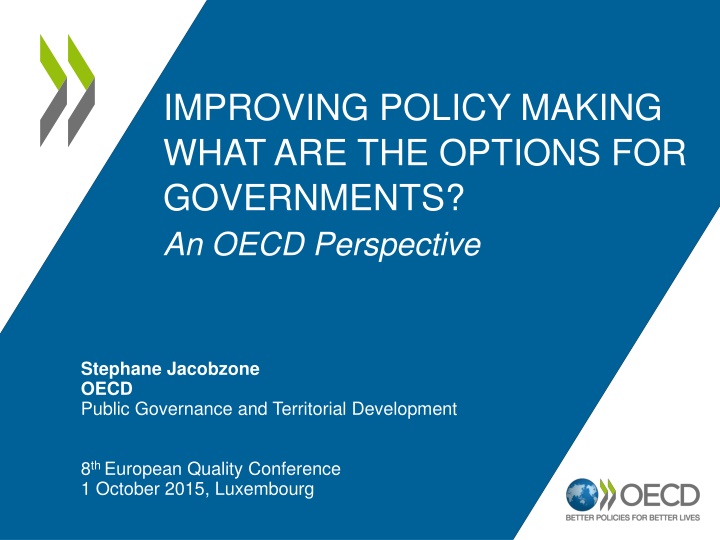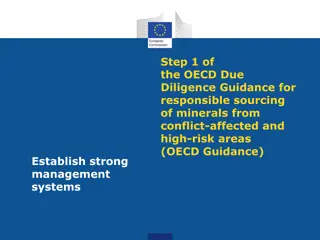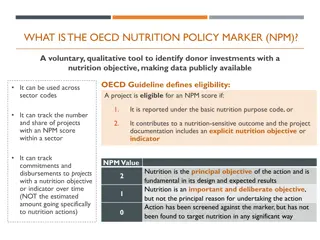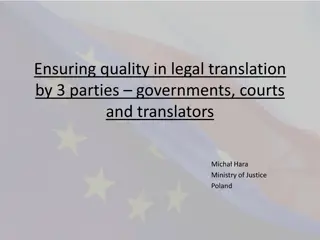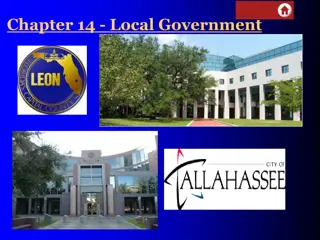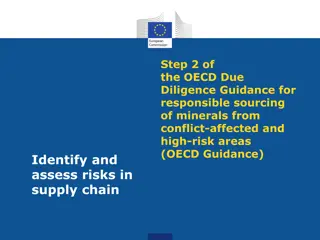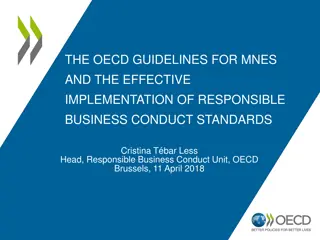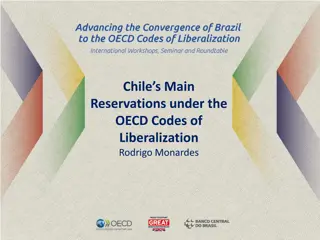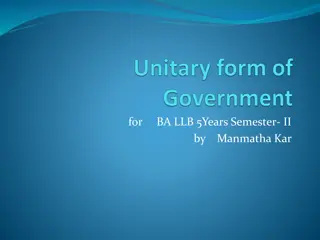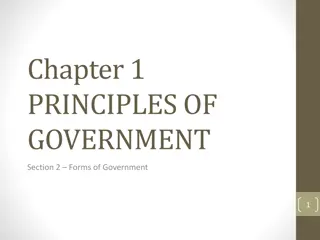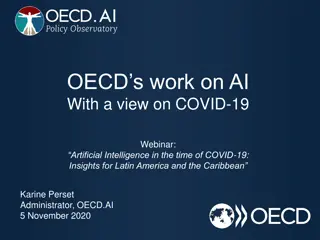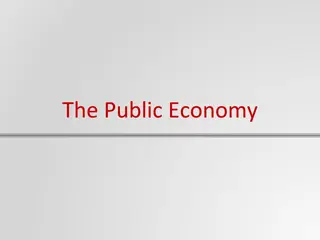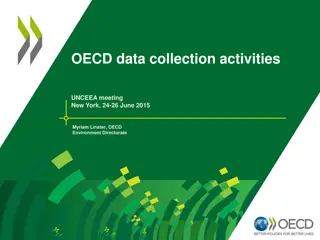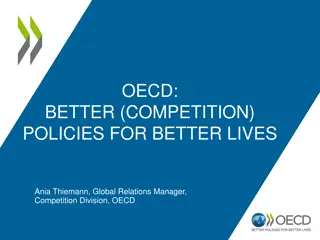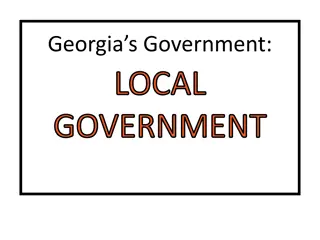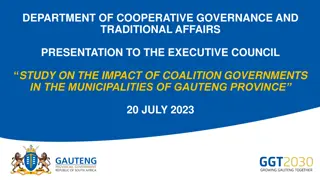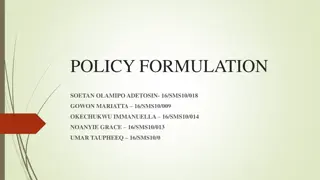Enhancing Policy Making: Options for Governments - An OECD Perspective
Various tools and approaches are discussed to improve policy making, including foresight, cost-benefit analysis, and regulatory tools. The changing context of policy challenges is highlighted, along with the OECD policy toolkit's modular approach. Strategies like talking to leaders, engaging stakeholders, and identifying a full range of instruments are emphasized for effective policy formulation and implementation.
Download Presentation

Please find below an Image/Link to download the presentation.
The content on the website is provided AS IS for your information and personal use only. It may not be sold, licensed, or shared on other websites without obtaining consent from the author.If you encounter any issues during the download, it is possible that the publisher has removed the file from their server.
You are allowed to download the files provided on this website for personal or commercial use, subject to the condition that they are used lawfully. All files are the property of their respective owners.
The content on the website is provided AS IS for your information and personal use only. It may not be sold, licensed, or shared on other websites without obtaining consent from the author.
E N D
Presentation Transcript
IMPROVING POLICY MAKING WHAT ARE THE OPTIONS FOR GOVERNMENTS? An OECD Perspective Stephane Jacobzone OECD Public Governance and Territorial Development 8th European Quality Conference 1 October 2015, Luxembourg
INTRODUCTION Well established tools: Foresight/scenarios, Cost benefit analysis, modelling, micro simulation, etc.. The policy cycle approach The EU toolbox for practitionners (2015) Tools for policy formulation (Jordan Turnpenny 2015) Regulatory tools, budgeting BUT GAP REMAINS GOVERNMENTS ARE DEMANDING FOR MORE
A NEW CONTEXT Complex policy challenges inclusive growth, wicked issues Reduced fiscal space Technological trends Potential of open data, crowd sourcing Role of the social media New demands from citizens Open government Transparency, co involvement in policy decisions Challenges to the internal workings of government: Policy siloes and fragmented institutions Need to transform information into actionable evidence Formulating coherent strategies that will connect with implementation Effectively integrating the results of ex post evaluation
THE OECD POLICY TOOLKIT A MODULAR APPROACH Talking to leaders Engagement practices Strengthening evidence: what works The role of advice Managing the risk of capture Taking advantage of behavioural approaches
TALKING TO LEADERS HELSINKI 2015 Identifying the context of decision making: Timing, urgency Does it fit with priorities What are the downsides and risks ? What will be the Impact ? Will I benefit ? Creating space for innovative solutions Alternatives to regulation Regulate first and tax and spend Behavioural approaches Some wiki writing
Identifying the full range of instruments Government of Canada, Treasury Board Secretariat (2012)
Engagement practices Stocktaking of open government practices Survey of Regulatory Policy practices : consultation Occurs late in the process forthcoming Regulatory Policy Outlook 2015
Evidence-based Decision-making Challenges in operationalising evidence in decision-making Silos in knowledge across government, moderate use of regulatory impact analysis Co-ordinating various sources of foresight evidence
Evidence-based Decision-making Do we assess the right impacts?
The role of crowd sourcing Crowdsourcing Facts Views and opinions Potential for open data Expertise in the public Role of new media channels
Mobilising the potential of open data OURdata Index: Open, Useful, Reusable Government Data, 2014 OECD Open Government data survey
The role of crowd sourcing Crowdsourcing Facts Views and opinions Potential for open data Expertise in the public Role of new media channels
THE UK WHAT WORKS APPROACH Using new evidence all the time ? Or taking stock of robust evidence ? Increasing productivity of policy making: directing resources where they are known to be more effective a achieving outcomes The example of health for medical practices (NICE, Health Technology Assessment, meta reviews of evidence Could we do the same for policies and policy making ?
A networked approach: the What Works Centres Centres for Health, Education, Crime reduction, Better Ageing, local economic growth etc. Standardising evidence of impact of policy intervention No good practice judgement: just a tool guide of what does work Strong empirical background
Expanding What Works at the international level First steps Publishing and incentives Mapping national initiatives Building capacity: meta evidence reviews, training foir civil servants Meta evidence reviews, Data labs
Expanding What Works at the international level Possible options in a second stage Multidimensional impacts ? inclusive growth agenda Sharing evidence and evidence gaps ? Collective funding for trialling ? Cross country architecture through OECD
DO WE HAVE THE RIGHT ADVICE ? Fragmented systems Ad hoc commissions Short termism New experiments: NZ Productivity Commission Research with NSOB Netherlands Features of advisory systems Typology of advisory system Role of strategy shops Governments capacity to remain strategic and ahead of the curve Evidence of impact
DO WE UNDERSTAND BEHAVIOURS? Role of behavioural approaches in regulation (Lunn Fragmented systems Bounded rationality Proven evidence Need to systematise and diffuse practices Ethical issues
STRENGTHEN CAPACITY FOR POLICY MAKING TO RESTORE THE CAPACITY TO GOVERN: Strengthening openness and creativity Understand the full range of policy instrument possibilities and the new hows of policy development A dirty secret: we like thinking within the box (same tools), and doing things the same old way (cognitive bias) Need to move outside our comfort zone central agency challenge function needs to play a role Virtuous competition of keeping up with the Joneses Food for thought for the central agencieds:
TOWARDS A BETTER GOVERNMENT! THANK YOU!
